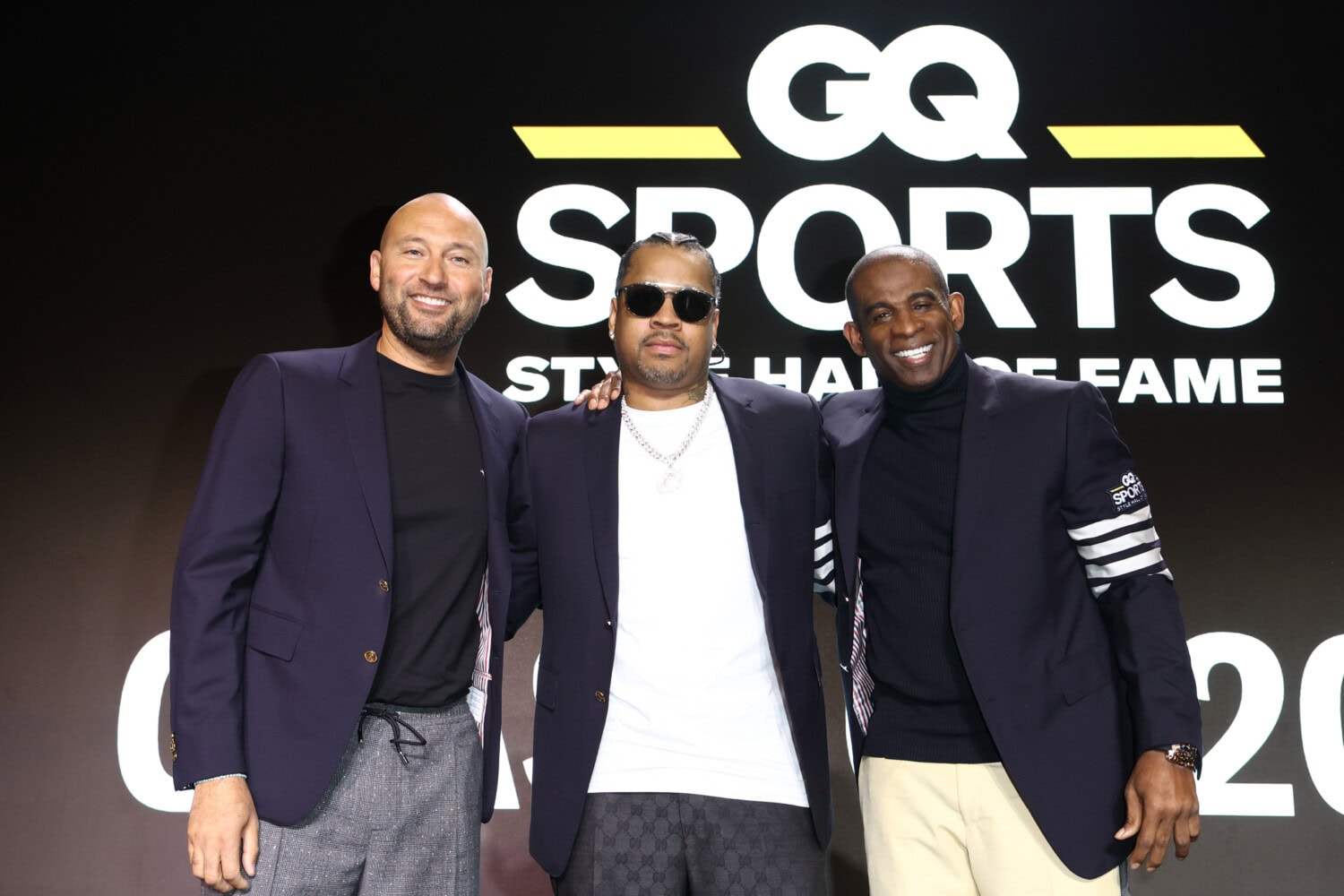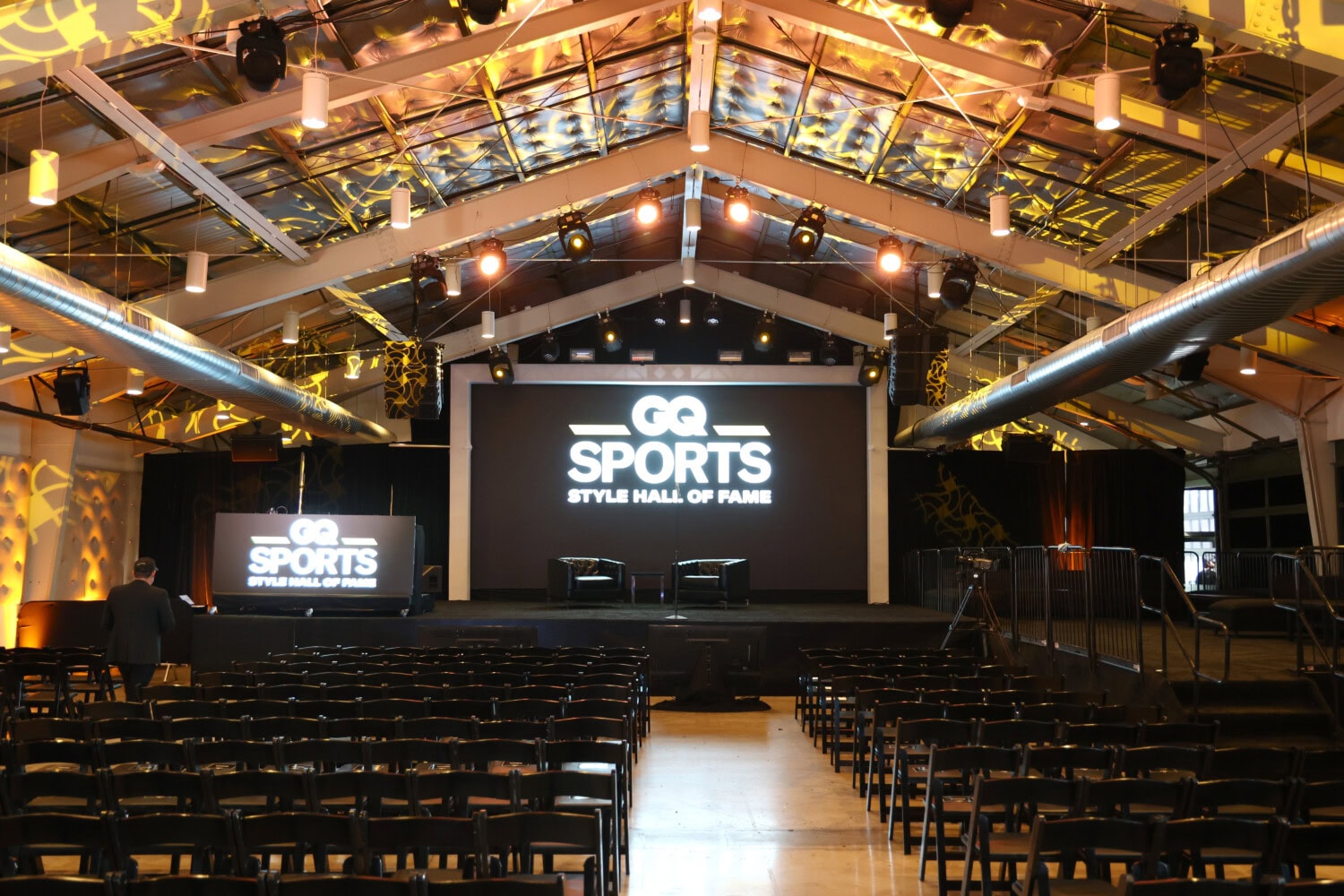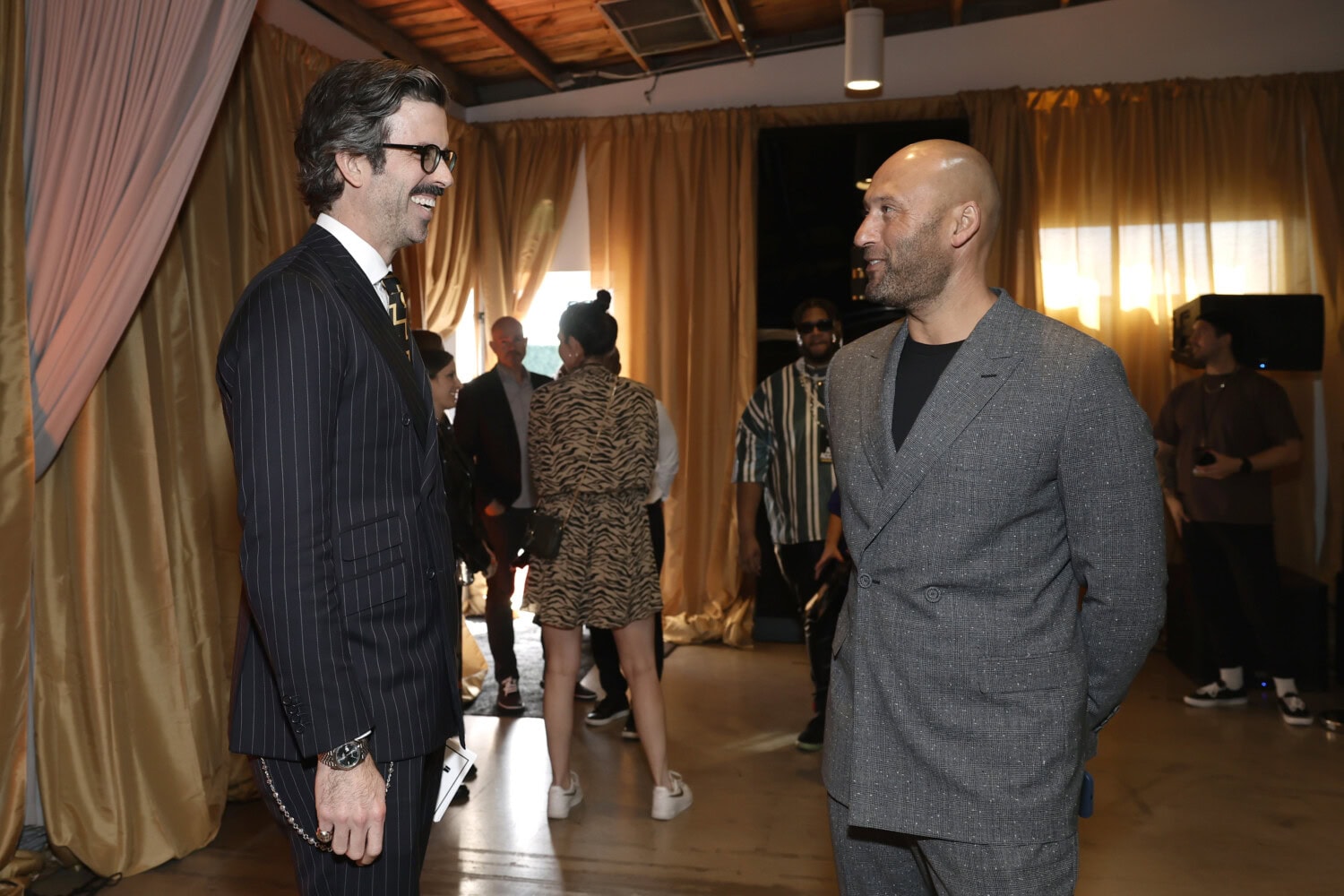Boardroom goes behind the velvet rope to capture the sights and sounds of Super Bowl week’s most distinctive events — including a night honoring the Captain, the Answer, and Coach Prime.
Louis Vuitton, Zara, Gucci, sports jerseys, Prada, H&M, Balenciaga, Aritzia, Off-White, and diamond-encrusted jewelry are on the bodies of people entering Feb. 11’s GQ Sports Style Hall of Fame event. The engagement is located at the Clayton House in Scottsdale, a venue that emerged as one of the most popular — and exclusive — of Super Bowl LVII week. Indeed, this is one of those rooms you almost certainly can’t get into even if you had $5,000 to spend on a ticket to the game, but Boardroom was there to take it all in.
The day before GQ hosts the event, Rolling Stone hosted a party at Clayton House featuring performances from Travis Scott and Robin Thicke, but any sign of that gathering is now wiped clean. This is GQ’s day; the iconic brand aims to enhance its legacy by launching its Sports Style Hall of Fame, and they’re doing it with three of the most beloved and influential athletes of the last 30 years: Deion Sanders, Allen Iverson, and Derek Jeter.
Prime Time, AI, and the Captain.

Of all the events I attended during Super Bowl week in Arizona, this one brought the most excitement. The crowd is diverse in nearly every respect; though everyone wears joyful looks on their faces, they show it in different ways — the modest number of children in the room are running around like this was a GQ Easter egg hunt as they desperately try to find the three superstar athletes who are nowhere to be found. The adults in the room range from college students to middle-aged folks and even senior citizens. The music playing in the background of the bacchanal is wide-ranging as well; we get Drake, Lil Baby, Young Thug, and Gunna on one end and Jay-Z, Nas, and 50 Cent on another.
As seats fill in, Will Welch, GQ’s Global Editorial Director, steps from behind a curtain and onto the stage. He begins by shouting out various cities, a surefire way to get the crowd buzzing and shouting, and it is officially time to begin.
“I am beyond thrilled to welcome you all to the first-ever GQ Sports Style Hall of Fame,” he says. “GQ was founded in 1957 and we have been covering sports from the very beginning, but in 2023 we were taking GQ Sports to another level, and that is what today is all about.

“We’re here to celebrate the cover stars.” Immediately, he corrects himself: “We’re here to celebrate the very fly cover stars. I’m talking about Derek Jeter, Allen Iverson, and Deion Sanders. When we decided to launch our own Hall of Fame, me and the GQ team asked ourselves a very simple question. We wondered who are the athletes that created the sports culture we all love today. And I would argue that without these three gentlemen, there are no such thing as tunnel fits [and] the world has way less swagger.”
As Welch’s remarks conclude and his voice fades down to zero, Jay-Z’s rises to 100. All-time Hov hit “Dirt Off Your Shoulder” begins unmistakably — “You’re now tuned into the muh’fuckin greatest” — before Timbaland’s bespoke beat comes stomping in. Even though the song was released nearly 20 years to the day (it dropped on March 2, 2003 if you’re keeping track), it rocks the crowd back and forth with heads bobbing and hands raised as multiple generations and fandoms rap along.
The Captain
It’s time for Derek Jeter to take the stage with GQ correspondent Brett Martin. The conversation is not as much on style as it is reminiscing on the Hall of Famer’s remarkable past, and not-so-surprisingly, there are Jeter superfans all over this place. The one sitting directly to my right shouts “Yeah!” quite literally every time Jeter finishes speaking.
“The 90s in New York were an unbelievable time… it was the birth of hip-hop and the hot place to be. I always said playing at Yankee Stadium feels like performing on Broadway,” Jeter says, not a single speck of dirt on his shoulder.
Martin asks Jeter if he had ever donned any outfits over the years that he regrets, and if you’re close enough to the stage, you can see Martin smirk as he asks. Jeter notices.
“Why you laughing? You think it’s funny?” he jokingly says before answering. “I wore some baggy suits, but that was the style back then, but now, it’s somewhat embarrassing. I don’t know that I necessarily regret anything, but I do get embarrassed by old pictures.”

The two speak of winning culture, including Aaron Judge being named the Yankees’ 16th captain, Major League Baseball’s ongoing rule changes, and a few fun trivia questions. As the conversation turns to his retirement, Jeter smiles.
“My biggest fear in life was being unprepared, so I spent the last 10 years or so deciding what I wanted to do next and started to prepare for it. People assume that when you retire from being a professional athlete, all you do is drink wine and golf, but that lasts for two weeks and then you have to find something else to do,” he says. “Change can be uncomfortable, but I think it helps you grow. I don’t think growth and comfort go together, and when you’re going from one career to another, it’s uncomfortable.”
As for Jeter’s current full-time job, it’s one of the most tried-and-true there is: Being a dad.
“I got three girls now. [They’re] five, four, and one.” The crowd ooohs at the sound of this, and Jeter acknowledges it. “Yeah, oooh is right. People ask me what my favorite music is and all I hear is Frozen and Encanto.”
The last question that Martin proposes is how his induction to the GQ Sports Style Hall of Fame measures up to other such halls he may or may not be a part of. The question is clearly a nod at the occasionally controversial Baseball Hall of Fame, but fortunately, Jeter’s answer is civil as he takes it in stride.
“C’mon, man, I can’t answer that right here… Look, I think when you’re a young player and you’re coming up, [you know] you have made it when you’re on the cover of GQ. I was lucky to be on a few of them, but it was definitely an honor.”

The Answer
A short break commences before GQ’s Mark Anthony Green is joined on stage by Allen Iverson. Green takes a moment to acknowledge Bubba Chuck’s greatness by summoning a young fan to the middle of the congregation. The wide-eyed kid walks up smiling from ear to ear and waves to everyone. “That is how everyone looked when you were in the league,” Green says. “Every white kid I went to school with wanted to be with you. Every Black kid I went to school with wanted to be like you. The thing we all agreed on was Allen Iverson. Did that freak you out?”
Iverson, who doesn’t do many speaking engagements or interviews, takes a moment to gaze into the crowd before answering.
“It definitely did. I remember I was just like that when it came to Mike [Michael Jordan]. I wanted to be like Mike, and so for years later, for kids and people in general to want to look up to be like me, it was a blessing,” Iverson says.
Green then inquires about the differences between Jordan and Iverson, from the way they carry themselves to their respective approaches to style.
“I didn’t [feel like anything I did was controversial]. I never felt that way. I always wanted to stay true to myself and who I am. What’s wrong with being you? Everybody else is taken up,” Iverson says. “I got a bad rap in the beginning because people didn’t understand and it was something they had never seen before. I came in, I wasn’t big on suits. I felt like, ‘Why would I wear a suit to a basketball game? After the game, I was going to go to the club or something.'”
That’s more than enough to elicit a laugh from the crowd.
“Growing up we wore suits to funerals and to church, and I never wore a suit to the park to hoop. I took ass-whooping for being myself, and what I think is bittersweet — because a lot of the athletes are able to express themselves the way they want to and dress and look like how they want to. When you look at a basketball game, everybody has a different game, so why would everybody dress the same or look the same?”
The talk shifts to on-court style as well, another AI hallmark. Iverson sported shooting sleeves and finger bands, two items that became much more popular after he blessed them with his effortless cool.
“I’m a big Deion [Sanders] fan, and I just remember what he said about if you look good, you play good, and I really took that serious. I always felt like I wanted to look like a superhero out there,” he says. “As a grown man, I used to sit in bed and think of different designs of my shoes and colors. I see guys today will have, like, a Celtic uniform and then red shoes on, and I could never do that. You wouldn’t have Superman with the red, white, and blue on and then have on Batman’s boots.”
The two speak about his Reebok Answer 5 television commercial, one of the most iconic sneaker spots of all time (and one that was later recreated by Beats by Dre, Ja Morant, and Lil Baby last year), as well as the NBA 75th Anniversary Team.
“Something that I will remember and cherish for the rest of my life is I was in awe of the guys before me and it was dope to see them react the way they were reacting to me,” he says. “That was the coolest thing, to see that had the same respect for me that I had for them.”
Notably, Iverson goes on to tell Green many of his most famous moments that led to his ultimate inclusion on the NBA 75 honor roll were essentially blackouts — he was so deeply in the zone that he tended not to remember doing anything so special until he got home and saw rants and raves on SportsCenter.
When asked what he is passionate about now that he’s retired and no longer crossing up superstars and slashing into the lane, his answer is simple: Spades and Monopoly. He also says he doesn’t care about any misconceptions critics might have about his life and his persona, an answer that draws some applause from the crowd.
To bring it all back home at tie things up with a GQ bow, the last question pertains to off-the-court apparel.
“It’s like the Captain said, it’s embarrassing. What’s so crazy is I used to go to Big and Tall and buy all of the 4X and 5X suits,” Iverson admits. “I would come into practice and all the big men in the squad would be mad as hell. It’s embarrassing, but I started something to [where] they had to implement a dress code in the league — it was obviously some bullshit because I’m in the GQ Hall of Fame.”
Saving his best bars for last, the kid from Hampton, Virginia gets his biggest ovation of the night.

Prime Time
Last up is Deion Sanders, who is accompanied by one of his disciples, six-time Pro Bowl wide receiver Chad “Ochocinco” Johnson. Sanders’ signature flamboyance is still very much a thing, but it is a bit more refined than what it used to be during his heyday as the NFL’s premier lockdown cornerback and kick return specialist.
The newly-minted Colorado Buffaloes head coach is ecstatic about being in GQ’s first Sports Style Hall of Fame class, as he considers himself well-versed on the subject.
“I pride myself on putting some clothes, so when GQ called, I said, WHAT?! Yes. You have no idea how much you blessed me,” Sanders says. “This was one of my dreams and this is iconic for me.”
But before Johnson gets to his first question, Sanders has one for the crowd:
“Who you want tonight: Prime, or do you want Coach Prime?”
The question gets a mixed response from the crowd before Ocho jumps in: “No, no, no, no, no, you want Prime.”
“Okay, I’ll do Prime.”
One of the first questions Johnson poses is about Sanders’ famous mantra: “You look good, you feel good, you feel good, you play good, you play good, they pay good.”
“Something about looking good makes you feel a lot better about what’s going on in your life,” Prime Time says. “You can be going through hell, high water, baby momma drama, and all kinds of stuff, but when you’re looking good, you can care less about all that nonsense. It’s a feel and an aura that you have.”
But he balks at the idea of players dressing up but not having the play to match their style, however.
“You can’t look good and don’t play good. That’s a violation, there should be a penalty thrown,” he insists. “Everybody should have a yellow flag to throw a penalty when you see somebody going down the street and their game, ambiance, or ability don’t match the look.”
Shortly after, Ochocinco and Sanders engage in a bit of a tradition: They line up across from one another as if Johnson was going to run a route and Sanders would defend him. The two have done this countless times, and it inevitably results in smack talk but ends in laughs.
They eventually discuss coaching, which Prime says he has always had a passion for, but he vows that he would never coach in the NFL because he has trouble coaching men who are paid handsomely. When Johnson mentions being a father, however, Sanders stops him in his tracks.
“I take that serious. Just because you can produce a child don’t mean that you a father,” he says. He gets some claps and shouts from those in the crowd who agree with him from experience.
Prime has always excused unwavering confidence that continues to shape the sort of coach and father he’s become, and Ochocinco says he believes it comes from playing the cornerback position. Prime agrees and begins to list reasons as to why he has never lacked belief in himself.
“First of all, we are handsome. Second of all, we got that [swagger]. Third of all, our confidence is our natural odor we don’t even use cologne. Fourth of all, it’s who we are not trying to be something that’s just who we are,” he says.
Sanders then delivers a quotation that captures the essence of the night’s entire event.
“The man never tries to be the man because he is the man. The person that tries to be the man validates that he’s not him, because you can’t try to be who you already are.”
Curtains Close
The event concludes with each of the legendary athletes receiving a navy blue sport coat courtesy of Thom Browne. On the left sleeve of the jacket are four stripes, and above them is the official GQ Sports Style Hall of Fame logo. Each athlete has a different flavor of acceptance speech befitting all they’ve done and seen at the apex of their professions, but all three share certain immutable sentiments regarding humility, gratitude, and cheer.
Welch, Jeter, Iverson, and Sanders subsequently disappear behind the stage curtains and aren’t seen again for the rest of the event. That doesn’t stop the party, though; attendees are still ordering drinks, eating fancy food, and mingling with one another. There are additional recognizable faces like Malcolm Jenkins, Antonio Cromartie, and Adam “Pacman” Jones on hand to add an extra dash of flavor.
The hotspot of the after-party is the photo wall, where guests take pictures against a poster featuring GQ Sports signage all over. As time rolls on, the crowd slowly makes its way toward the door, but on this night, GQ has opened another one.
The GQ Sports Style Hall of Fame’s first class is an iconic trio of athletes who made statements on and off the field and continue to have their say today awash in a rare level of deference few ever have the chance to earn. In due time, its exclusive ranks will include more than three, but nothing could change the fact that Prime Time, AI, and the Captain refuse to lose their knack for blazing new trails even with their brilliant playing careers behind them.